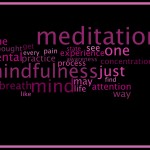
When I teach meditation I ask people to sit still and not make a problem out of whatever their experience happens to be. And I explain that what we experience in meditation doesn’t matter because the quality of meditation is not measured in terms of our experience during practice.
When people have difficulty with this way of meditating its because that they assume that to have no problem they have to feel good, so without realizing it they try to manipulate their experience into one they find acceptable.
This is when they start to wonder if they are engaging in spiritual bypassing. They are, but what they don’t realize is that they are not practicing no problem.
When we feel good it’s easy to have no problem, but when we feel bad it’s hard. In fact, most of us, most of the time, believe that in order to have no problem we have to feel good.
Feeling bad does not mean you have a problem.
Having a problem means something is wrong. That means that things are not the way they should be. We have been raised in a culture that tells us that we should feel good. If we feel bad we are made to believe that something is wrong – and maybe even wrong with us.
But everyone feels bad sometimes. Yes, we all want to feel good, but that doesn’t mean that we shouldn’t feel bad. Feeling bad is a part of life.
True spiritual practice is not about avoiding pain. It is about embracing life – all of life.
Spiritual bypassing
Spiritual bypassing occurs when we use our spiritual work as a means of avoiding things that make us uncomfortable. The danger of course is that we avoid dealing with psychological issues or dysfunctional situations because they are uncomfortable to face.
Spiritual bypassing, as I see it, is part of a larger phenomenon that we could call emotional bypassing. The root cause of emotional bypassing is our desire to feel good and not to feel bad.
Yes, you can use The Practice of No Problem to emotionally bypass, you can also use drugs or alcohol, financial acquisition, sex, or even psychotherapy. Almost anything can be used as an excuse not to face life’s challenges.
If our primary motive is feeling good then we will find ways of avoiding feeling bad whenever we can.
Spiritual practice
True spiritual practices are not designed for the purpose of emotional bypassing. They are designed to liberate us – not from pain but from the need to feel good in order to be OK. Real spiritual practice should increase our capacity to face the challenging aspects of life.
The contentment that The Practice of No Problem points to is ever-present – even when we feel bad.
You can’t measure the quality of your meditation based on how you feel during meditation. How you feel during meditation doesn’t tell you much of anything. I’ll be honest with you. I don’t usually feel that great when I meditate.
Sure, sometimes I have expansive openings into abiding peace or blissful realizations of deeper truth, but a lot of the time I’m just sitting with a mind that tells me I should be doing something else. In meditation I feel antsy and uncomfortable more often than I feel light, happy, and free.
But I know that how I feel during meditation doesn’t tell me anything about the strength of my practice. What does tell me is how I show up in life.
Here’s an example.
How to show up in life
Six years ago I got a call from the local hospital. My wife had been in a head-on collision with an 18-wheeler and they told me I should come to the hospital immediately. They wouldn’t tell me anymore than that over the phone.
I was in no shape to drive so a friend took me to the hospital. As we drove I could feel the panic rising up in my body. I couldn’t control it. I was shaking all over. I was so scared. My mind kept telling me that my beautiful wife might already be dead, or in a coma, or horribly disfigured.
In that moment I didn’t practice having no problem. That would be ludicrous.
But I also wasn’t swallowed up by the panic. I remained present. I saw what was happening and I realized that I didn’t know what I was going to find at the hospital, and whatever it was I knew that I was going to deal with it.
As I sat in the car a thought came to me. If my wife is dead or in a coma will that mean that life is bad. I considered it and realized that, no, life would still be good. My life might be terrible, but life itself would be good in spite of my horrifying misfortune.
At that point I felt the panic subside. The universe was going to be OK no matter how difficult things got for me.
I wasn’t challenged beyond that. I got to the hospital to find my wife alive. Her ankle was shattered and she had cuts and bruises all over, but she was going to live.
The strength of my practice can’t be measured by how bored I get when I meditate. It can be measured by the degree to which I don’t lose myself under challenging circumstances.
My wife’s story is much more remarkable than mine.
After the accident she found herself trapped inside a pile of twisted metal. She couldn’t move a muscle. Can you imagine the temptation to panic?
She realized that this was likely to be the end of her life and she was determined to die with grace and dignity. She didn’t try to kick and scream. She started breathing deeply, consciously willing herself to relax.
Soon a man stopped and reached in through the window of the car and held her head until the fire trucks arrived.
For 45 min she heard the sound of metal grinding as they cut the car away from her body and the whole time she maintained her breathing and her calm.
I wish I could say that I would be able to maintain composure like my wife under similar circumstances, but I won’t know unless it happens.
Realizing the inherent goodness of life
The Practice of No Problem is not about emotional bypassing. It is not about pretending that having your wife injured, or your body trapped in wreckage is OK.
It is about realizing the inherent goodness of life so deeply that you can be with anything that is happening, no matter how difficult it is, without losing yourself.
When we practice having no problem we discover a depth of consciousness below all the problems. We realize that pain is not a problem, fear is not a problem, boredom is not a problem. These are all part of life and we can handle them if we have the wherewithal to stay with the reality of what is happening and not avoid it.
The Practice of No Problem is about gaining the strength of character and the presence of mind to be with life however it shows up.
I am not free of my tendencies for emotionally bypassing. I avoid pain when I can. And meditation alone does not ensure that I will face all of the uncomfortable places inside myself.
I get support for that. I regularly work with someone who helps me face things I might otherwise avoid and I recommend you do the same.
The trust in life that I have found in meditation provides the solid ground from which I can embrace all of life, and in one very challenging circumstance I discovered that when push came to shove I didn’t shrink from the pain of existence.
I was ready to deal with it whatever it was.
I am passionate about meditation because of how it supports us to live with dignity and grace even when challenged.



Jeff,
This is a really good blog. I have been meditating for most of 40 years and I think you have described the relationship of me the meditator and the act of meditating and the reasons to meditate well. Meditation is not the cure all but it is so powerful in my life. I still have lots of areas of my life that need work and seek help for those areas, but as I look back on my life, clearly meditation helps me be real in this life.
Thank you
Sam Maropis
This was exactly what I needed to read. I love this post for so many reasons, but the main reason is because when I’m feeling off, or sad, I don’t meditate. I always thought I had to be in a good mindset or mood to meditate. It never occurred to me that if I wasn’t feeling great I should still meditate, and if I still don’t feel great at the end of meditating that’s o.k.! And I’m so glad your wife is o.k. too.
Thank you, Roslyn
Excellent blog. I enjoyed reading some of your insights. Your main point regarding emotional bypassing is such an important topic in today’s culture. Thank you for your insight and writing a very helpful blog.
Thanks you for sharing your personal story with us. What a great example of how meditation helps in life.